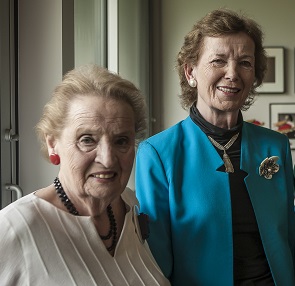Mary Robinson delivered the fourth Madeleine K. Albright Global Development Lecture at the Aspen Institute in Washington DC on the topic of climate justice. The lecture recognises an exceptional individual whose vision has provided breakthrough thinking to tackle the challenges of global development.
Delivering her speech, Mary Robinson said climate change is a global development issue “because the traditional model of development we have used to date, based on the consumption of fossil fuels, has caused climate change. Climate change is now undermining, and risks reversing, hard won development gains”.
Commenting on recent global events, Mrs Robinson said that she has been struck by the moment of history we are in. “Violence, injustice and natural disasters are taking their toll. It is hard as observers of the news and social media not to be worried and afraid as this deluge of suffering, hate and intolerance undermines human dignity.”
While the world has made a lot of progress and “we have shared values as an international community that bind us together and that hold us accountable to each other” she commented that recent events “remind us of how fragile that progress is and how hard we need to continue to work to both protect and accelerate that progress, while sharing it more fairly – so that all people have equal opportunity”.
Mrs Robinson pointed out the links between climate change and sustainable development, “we cannot have peaceful and prosperous societies without taking urgent action on climate change”. “When we look at the world today and see the challenges of inequality, poverty and injustice – we also have to face the fact that climate change is already having a multiplier effect on these problems.”
She discussed the “injustice” of climate change, “that those who are most vulnerable in society, no matter the level of development of the country in question, will suffer the most. This means that people who are marginalised or poor, women, indigenous people, slum dwellers and migrants will be disproportionately affected by climate impacts”.
A change in narrative on climate change “from doom and gloom to one of purpose and opportunity” is one of the reasons an ambitious agreement was reached at the UN climate change conference in Paris last year, said Mrs Robinson. The next step is for the Paris Agreement to be ratified and its provisions implemented, she said. Mrs Robinson emphasised that a Principle of Climate Justice needs to be at the heart of this effort. “A principle that can help to ensure that policies adopted and actions delivered are inclusive, equitable and transformative. The Principle is ‘Ensure that Decisions on Climate Change are Participatory, Transparent and Accountable’.”
Climate Justice is “based on hope, on respect for human rights and on the belief that by working together we can create a better future for present and future generations,” she added.
Related Links
Our Work on Human Rights and Climate Change
Protecting the Rights of Climate Displaced People – a Position Paper


